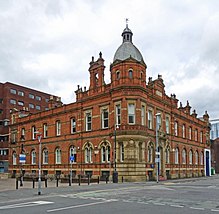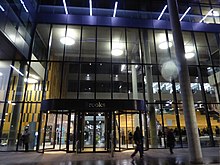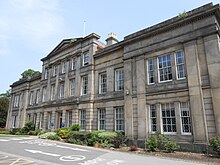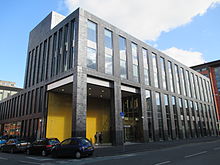Manchester Metropolitan University
 | |
Former name | Manchester Polytechnic |
|---|---|
| Type | Public |
| Established | 1843 (Manchester School of Design) 1970 (as Manchester Polytechnic) 1992 (gained university status as Manchester Metropolitan University) |
| Endowment | £1.0 m (2015)[1] |
| Chancellor | Peter Mandelson[2] |
| Vice-Chancellor | Malcolm Press[3] |
| Students | 33,010 (2016/17)[4] |
| Undergraduates | 26,780 (2016/17)[4] |
| Postgraduates | 6,235 (2016/17)[4] |
Other students | 200 FE[5] |
| Location | Manchester , England, UK 53.47053, −2.23872 |
| Campus | All Saints, Birley Fields, Crewe |
| Affiliations | University Alliance Association of Commonwealth Universities NWUA Association of MBAs EUA |
| Website | www.mmu.ac.uk |
Manchester Metropolitan University (often abbreviated MMU) is a public university located in Manchester, England. The university traces its origins to the Manchester Mechanics Institute[6] and the Manchester School of Design, which formed Manchester Polytechnic in 1970. Manchester Polytechnic then gained university status under the government's Further and Higher Education Act, becoming the Manchester Metropolitan University in 1992. Today, it is headquartered in the city of Manchester, with additional facilities in Cheshire.
Manchester Metropolitan University is an accredited member of the Association of MBAs, and member of the University Alliance, the Association of Commonwealth Universities, the North West Universities Association, Association to Advance Collegiate Schools of Business and the European University Association.
Today, it is also home to the Manchester School of Art, the Manchester School of Theatre, as well as the Manchester School of Architecture (MSA) administered in collaboration with the University of Manchester.
The University's logo is derived from the upper part of the shield of the university crest, with six spade-irons positioned together, suggesting hard toil and entrenchment.
Contents
1 History
2 Campuses
2.1 All Saints Campus
2.2 Cheshire Campus
2.3 Birley Campus
3 Organisation
3.1 Governance
3.2 University structure
3.3 Finances
4 Academics and rankings
4.1 Academics
4.2 Rankings and research
5 Students' union
6 Notable alumni
7 References
8 External links
History
Manchester Met was developed from mergers of various colleges with various specialisms, including technology, art and design. Its founding can be traced back to the Manchester Mechanics Institute,[6] and the Manchester School of Design latterly known as the Manchester School of Art. The painter L. S. Lowry attended in the years after the First World War, where he was taught by the noted impressionist Adolphe Valette.[6]
Schools of Commerce (founded 1889), Education (f. 1878), and Domestic Science (f. 1880) were added alongside colleges at Didsbury, Crewe, Alsager and the former Domestic and Trades College (f. 1911). The school renamed itself as Manchester Polytechnic in 1970, which was followed by series of mergers with the Didsbury College of Education and Hollings College in 1977, as well as City of Manchester College of Higher Education in 1983. In 1987, the institution became a founding member of the Northern Consortium, and became a corporate body on 1 April 1989 as allowed by the terms of the Education Reform Act.
On 15 September 1992, Manchester Polytechnic finally gained university status under the wide-sweeping Further and Higher Education Act 1992, and has since rebranded as Manchester Metropolitan University.
After earning university status, Manchester Met absorbed Crewe and Alsager College of Higher Education, and the Manchester School of Physiotherapy (MSOP) in 2004: an institution officially formed in 1991 through the amalgamation of the Manchester Royal Infirmary (M.R.I.) and Withington Hospital Schools of Physiotherapy.[7] MSOP was previously affiliated with the Victoria University of Manchester, which conferred degree-level courses by extension until the final Class of 2005.[8] MSOP joined Manchester Metropolitan University as the Department of Physiotherapy in 2004, and was later renamed as the Department of Health Professions. Today, it offers undergraduate and postgraduate studies, a three-year undergraduate honours programme, and National Vocational Qualification (NVQ) programmes for unqualified support workers in the field of physiotherapy.[7]

Ormond Building
Campuses

Brooks Building

Manchester Metropolitan University Business School

Didsbury Campus
The university was previously located on seven sites: five in Manchester (All Saints, Aytoun, Didsbury, Elizabeth Gaskell, and Hollings) and two in Cheshire (Alsager and Crewe). However, the university later closed two of the seven sites to rationalise its estate. The university moved the work of the Alsager campus to Crewe, while the Aytoun campus was closed in 2012 following the opening of an All Saints Campus business school. In 2011, the university announced a £350 million investment programme for the largest physical change to its estate since its foundation. The Elizabeth Gaskell, Hollings and Didsbury campuses were closed in 2014, with faculties being relocated to campuses at All Saints and Birley.[9]

Righton Building
All Saints Campus

Statue of John Dalton by William Theed outside the university's building in Chester Street
All Saints campus is one of the university's 2 campuses.
The Faculty of Humanities, Languages and Social Science was split between the Geoffrey Manton and Mabel Tylecote buildings. The Geoffrey Manton Building accommodates the English, History and Economic History, Information and Communications, Politics and Philosophy, and Sociology departments. The Languages department was housed in the Mabel Tylecote Building until the building was demolished in 2017 to make way for a new Arts and Humanities building on the site.[10][11]
The John Dalton Building, on Chester Street is the home of the Faculty of Science and Engineering.[12] It comprises four schools: the School of Healthcare Sciences, the School of Computing, Mathematics & Digital Technology, the School of Engineering, and the School of Science and The Environment. To the rear of the John Dalton Building is JD tower, housing the university's main science laboratories including IRM,[13] the Institute for Biomedical Research into Human Movement and Health.
The Manchester School of Art on the All Saints Campus is composed of four departments: The Manchester School of Architecture (operated jointly with the University of Manchester Faculty of Humanities); Department of Art; Department of Design; Department of Media.[14] The School of Art houses the Holden Gallery which has a continuous programme of exhibitions and is open free to the public.[15] The university has invested in improving the Manchester School of Art building granting £35 million to facilitate three changes including: a new building for the school, refurbishment of the workshops and renovation of the studios. In 2014 the Benzie Building was nominated for the Stirling Prize.[16][17]
New premises costing £75 million for the Faculty of Business and Law have been built on All Saints Campus and the Business School re-located to this building from the Aytoun Campus in 2012.[18] It will house more than 5,000 students and 250 staff.[19] The new building is an original architectural concept with three towers under a single glass roof.[citation needed] Green credentials are an integral part of the building's design which incorporates solar panels and heat pumps to power the building and a rain water recycling scheme.[19] The Manchester Law School is in the Sandra Burslem building which opened in 2003.
The university library, renamed the Sir Kenneth Green Library, is on the All Saints campus. It houses a number of special collections mainly relating to the fine and applied arts, like the Laura Seddon Greeting Card Collection, a collection of 32,000 Victorian and Edwardian greeting cards.[20] The library is in the All Saints Building where it occupies three floors. It was planned as a single central library in 1972 but after the mergers with the Didsbury College of Education and Hollings College it became a central library and administrative centre for seven library sites. From 1975 a catalogue was produced with the aid of the Birmingham Libraries Co-operative Mechanisation Project.[21] From 1992 the library was part of the Consortium of Academic Libraries in Manchester (CALIM) which was extended in 2002 to become NoWAL, the North West Academic Libraries.[22]

Grosvenor Building, MMU School of Art
Cheshire Campus
The second campus is based in Crewe, Cheshire. The Pro-Vice-Chancellor of the Cheshire campus is Professor Christine Horrocks.[23]
The Cheshire campus is home to over 2,000 students from around the world, supported by over 400 staff across 150 undergraduate and postgraduate courses in the arts, business, education, humanities and sport science.[24]
Academic staff regularly win Students’ Union teaching awards and departments on campus have numerous accreditations from professional bodies.[25][26] The strong regional, national and international links mean that graduates at the campus have had a wealth of opportunities to work with industry professionals, from Paralympic and Olympic athletes and artists to business leaders and high-profile practitioners in health, welfare and social care.[27][28][29][30]
Manchester Met announced on Friday 25 November 2016 following a board meeting it looked to close the Crewe campus by summer 2019. The decision was made following an independent review conducted by financial advisory firm Deloitte, the university cited a poor intake in students as a main reason for closure.[31][32]
Birley Campus
2014 saw the opening of a highly environmentally sustainable £140 million development situated on the Birley Fields site in Hulme, Manchester, creating a central location for the Faculties of Education and Health following the closure of the Didsbury and Elizabeth Gaskell campuses. Alongside the academic building there is student accommodation for up to 1200 students comprising ultra-modern, environmentally sustainable townhouses and traditional student apartments.[33]
Organisation
Governance
In common with most universities in the United Kingdom, Manchester Metropolitan University is headed formally by the Chancellor, currently Lord Mandelson but led by the Vice-Chancellor, currently Professor Malcolm Press.
The University's Board of Governors is responsible for determining the educational character and mission of the University. It also falls to the Board of Governors to ensure that the University's resources are used in line with the University's Article of Government. It also safeguards the University's assets and approves the annual estimates of income and expenditure.[34]
The Board of Governors is responsible for broad policy but the Vice-Chancellor, along with the Executive and Directorate, is responsible for overall management, policy implementation, organisation, operations and direction of the University.[35]
In December 2014, it was announced that Malcolm Press[3] had been appointed to succeed John Brooks[36] as Vice Chancellor on 1 June 2015.[37]
University structure
The university is organised into 6 faculties:
- Arts and Humanities
- Business and Law
- Cheshire
- Education
- Health, Psychology and Social Care
- Science and Engineering
In the session 2016/17, the University had 33,010 students, making it the sixth largest university in the UK (out of 167).[4] The University employs 4,400 staff, comprising almost 1,500 full-time teaching staff, 700 part-time teaching staff and 2,200 support staff.[38]
Finances
In the financial year ended 31 July 2011, Manchester Metropolitan University had a total income of £248,028,000 (2009/10 - £243,606,000) and a total expenditure of £213,103,000 (2009/10 - £220,221,000).[38] The University's collects £106,857,000 from tuition fees and education contracts (2009/10 - £101,640,000) and attracts £4,992,000 in research grants and contracts (2009/10 - £4,414,000). Income from other sources totalled £31,371,000 (2009/10 - 30,524,000).[38]
Academics and rankings
Academics
Manchester Met has admitted applications from a broad range of UCAS tariff points, with an average of 343.7 in 2015, and 132.6 in 2018 under the new system.[39][40]
The university receives approximately 52,000 applications every year. It is the second most applied-to university in the UK, following the University of Manchester,[41] and boasts the fifth-largest higher education institution student body size in the UK based on its number of admitted and enrolled students. Approximately 94% of Manchester Met's full-time undergraduate students come from within the UK, while the overall student body with graduates and post-graduates is approximately 85% domestic, and 15% international. Composition of academic faculty staff is relatively similar with 85% domestic, and 15% international.[42]
| Global rankings | |
|---|---|
QS (2019)[43] | 801-1000 |
THE (2019)[44] | 601-800 |
| National rankings | |
Complete (2019)[45] | 57 |
Guardian (2019)[46] | 73 |
Times / Sunday Times (2019)[47] | 80 |
| British Government assessment | |
Teaching Excellence Framework[48] | Silver |
Rankings and research
According to The Complete University Guide, Manchester Met is ranked #57 out of 119 within the UK, based on overall rating, entry standards, research quality, and graduate prospects.[49] The Times Higher Education World University Rankings dropped Manchester Met's national ranking from #64 to #82 in 2018, and continued to rank the university in the #601-800 tier internationally.[50]
The Economist has ranked MMU #92 out of 124 within the UK in degree value, based on statistics from the Department for Education, which indicated MMU degrees having a negative effect on graduate prospects.[51]
In terms of research, Manchester Met is ranked fourth within new universities attracting research funds from the Higher Education Funding Council for England, one of several institutions that fund higher education research programmes.[49] The university has thirteen research centres:
- Advanced Materials and Surface Engineering
- Bioscience Research Centre
- Centre for Applied Computational Science
- Centre for Creative Writing, English Literature and Linguistics
- Centre for Decent Work and Productivity
- Ecology and Environment
- Education and Social Research Institute
- Future Economies
- Health, Psychology and Communities
- History Research Centre
- Manchester School of Art Research Centre
- Musculoskeletal Science and Sports Medicine
- Research Centre for Applied Social Sciences
Students' union

MMU Students' Union
The students' union has buildings on both campuses. The Students' Union exists to represent all members at the Manchester Metropolitan University and students on accredited external courses. The union is controlled by the Union Officers Group formed of six students and recent graduates of the university, elected by the students to control the Union on their behalf. A shop especially designed to cater to the university students has also been set up inside the Students' Union.
The students' union moved in January 2015 to a new purpose built building on Higher Cambridge Street, next to Cambridge and Cavendish Halls of Residence.
Notable alumni
Some in the list attended institutions which became part of present-day Manchester Metropolitan University.
Bartosz Beda - contemporary artist
Bethany Black – comedian
Lord Bradley – life peer and former Member of Parliament
Eleanor Burnham – Welsh politician and former Welsh Assembly Member
John Bishop – comedian
Sarah Burton – fashion designer, creative director of Alexander McQueen
Ian Clark – film director and screenwriter
Brendan Coogan - presenter
Steve Coogan – actor and comedian
James Corner – landscape architect
Brian Cosgrove – animator, producer, director
Tony Cunningham – Member of Parliament
Daley – singer-songwriter[52]
DJ Semtex – BBC Radio 1Xtra DJ
Nicholas Drew – strategist and business alumnus
Jenny Eclair – comedian
Huw Edwards – Former Member of Parliament
Michelle Fairley - actress- Graham Fellows
Peter Fraser – photographer
James Frith - Member of Parliament
Malcolm Garrett – graphic designer
Joy Gregory – artist
Paul Goggins – Member of Parliament
Burn Gorman – American-born actor
Danny Grewcock MBE – England rugby player
Richard Griffiths – actor
Patrick Harvie – Scottish Green Party MSP
Graeme Hawley – actor
Thomas Heatherwick – designer- Zoe Henry
Bernard Hill – actor- Jeff Hordley
Norman Horrocks – former Professor Emeritus, Dalhousie University
Mick Hucknall – musician, Simply Red- Phil Ineson
Gethin Jones – Welsh television presenter
Vernon Kay – radio (BBC Radio 1) and television presenter[53]
Matthew Kelly – actor and presenter
Afzal Khan - Member of Parliament
Rebecca Long-Bailey - MP for Salford and Eccles
John Mayall – blues musician
John McGeoch – musician, guitarist
Jonathan Mildenhall - Chief Marketing Officer at Airbnb
Siwan Morris – Welsh actress
Gareth Owen – footballer
Martin Parr – photographer
Heather Peace – Actress and musician
Laura Pidcock - MP for North West Durham- Natalie Pike
David Potts – CEO, Morrisons[54]- Peter Purves
Jamie Reed – Member of Parliament
Gwendoline Riley – author
Erol Sabancı – Vice President, Sabancı Holding
Peter Saville – graphic designer
Janek Schaefer – British Composer of the Year in Sonic Art- Lord Paul Scriven – Life Peer and former Leader of Sheffield City Council
Grant Shapps – Member of Parliament- Sir Antony Sher – actor
Laura Smith - Member of Parliament
Liam Spencer – artist
Debra Stephenson – actress, impressionist and singer- Linder Sterling
Gisela Stuart – Member of Parliament
Kerrie Taylor – actress
Marsha Thomason – actress
John Thomson – actor and comedian- Dianne Thompson
Darren Tulett – sports presenter on French television
Michael J. Turner – Chairman of Babcock International
Julie Walters – actress
Paul S. Walsh – Chief Executive Officer of Diageo
Mary Whitehouse – Christian morality campaigner- Stephen Whittle
Richard Woolfe – Broadcasting manager- Carey Young
References
^ "Financial Statements Year Ended 31 July 2015" (PDF). Finance.mmu.ac.uk. Archived from the original (PDF) on 31 October 2016..mw-parser-output cite.citationfont-style:inherit.mw-parser-output qquotes:"""""""'""'".mw-parser-output code.cs1-codecolor:inherit;background:inherit;border:inherit;padding:inherit.mw-parser-output .cs1-lock-free abackground:url("//upload.wikimedia.org/wikipedia/commons/thumb/6/65/Lock-green.svg/9px-Lock-green.svg.png")no-repeat;background-position:right .1em center.mw-parser-output .cs1-lock-limited a,.mw-parser-output .cs1-lock-registration abackground:url("//upload.wikimedia.org/wikipedia/commons/thumb/d/d6/Lock-gray-alt-2.svg/9px-Lock-gray-alt-2.svg.png")no-repeat;background-position:right .1em center.mw-parser-output .cs1-lock-subscription abackground:url("//upload.wikimedia.org/wikipedia/commons/thumb/a/aa/Lock-red-alt-2.svg/9px-Lock-red-alt-2.svg.png")no-repeat;background-position:right .1em center.mw-parser-output .cs1-subscription,.mw-parser-output .cs1-registrationcolor:#555.mw-parser-output .cs1-subscription span,.mw-parser-output .cs1-registration spanborder-bottom:1px dotted;cursor:help.mw-parser-output .cs1-hidden-errordisplay:none;font-size:100%.mw-parser-output .cs1-visible-errorfont-size:100%.mw-parser-output .cs1-subscription,.mw-parser-output .cs1-registration,.mw-parser-output .cs1-formatfont-size:95%.mw-parser-output .cs1-kern-left,.mw-parser-output .cs1-kern-wl-leftpadding-left:0.2em.mw-parser-output .cs1-kern-right,.mw-parser-output .cs1-kern-wl-rightpadding-right:0.2em
^ University, Manchester Metropolitan. "Story, Manchester Metropolitan University". www.mmu.ac.uk.
^ ab PRESS, Prof. Malcolm Colin. ukwhoswho.com. Who's Who. 2015 (online Oxford University Press ed.). A & C Black, an imprint of Bloomsbury Publishing plc.
(subscription required)
^ abcd "2016/17 Students by HE provider, level, mode and domicile" (CSV). Higher Education Statistics Agency. Retrieved 25 March 2018.
^ "Table 0a – All students by institution, mode of study, level of study, gender and domicile 2006/07". Higher Education Statistics Agency. Archived from the original (Microsoft Excel spreadsheet) on 9 July 2013. Retrieved 11 April 2008.
^ abc "About Manchester Metropolitan University". 2.mmu.ac.uk. Retrieved 30 August 2012.
^ ab "School of Physiotherapy launched | News & Events | Manchester Metropolitan University". Mmu.ac.uk. Retrieved 2015-11-02.
^ Brian S. Pullan; Michele Abendstern. A History of the University of Manchester, 1973-90. Books.google.co.uk. Retrieved 2015-11-02.
^ "Campus Redevelopments". Mmu.ac.uk. Retrieved 15 February 2011.
^ "The Faculty of Humanities, Languages and Social Science". MMU. Retrieved 16 February 2012.
^ "Arts and Humanites(Estates development)". MMU. Retrieved 16 January 2018.
^ "Faculty of Science and Engineering". MMU. Retrieved 26 April 2012.
^ "IRM". MMU. Retrieved 26 April 2012.
^ "The Faculty of Art and Design". MMU. Retrieved 16 February 2012.
^ "The Holden Gallery". MMU. Retrieved 16 February 2012.
^ "New Spaces. New Facilities. New building". Artdes.mmu.ac.uk. Retrieved 2015-11-02.
^ "Manchester School of Art". Architecture.com. Retrieved 2015-11-02.
^ "Accounts 0066" (PDF). Finance.mmu.ac.uk. Retrieved 2015-11-02.
^ ab "Campus Redevelopment". Mmu.ac.uk. Retrieved 2015-11-02.
^ MMU Library Electronic Services Development Team. "MMU Special Collections". Specialcollections.mmu.ac.uk. Retrieved 15 July 2015.
^ Rogerson, Ian (1978) "Library", in: The Making of a Polytechnic Building: All Saints Building. Manchester: Manchester Polytechnic; pp. 34–36
^ "Nowal". Nowal.ac.uk. Retrieved 15 July 2015.
^ "Meet the team | Cheshire Campus". www.cheshire.mmu.ac.uk. Retrieved 2016-05-04.
^ "Who we are and what we do | Cheshire Campus". www.cheshire.mmu.ac.uk. Retrieved 2016-05-04.
^ "News Article | News & Events | Department of Business & Management | Cheshire Campus". www.cheshire.mmu.ac.uk. Retrieved 2016-05-04.
^ "About Us | Department of Exercise & Sport Science | Cheshire Campus". www.cheshire.mmu.ac.uk. Retrieved 2016-05-04.
^ "Sarah Storey's world record warmly welcomed | News & Events | Manchester Metropolitan University". www.mmu.ac.uk. Retrieved 2016-05-04.
^ "News Archive Article | MMU Cheshire". www.cheshire.mmu.ac.uk. Retrieved 2016-05-04.
^ "News Archive Article | MMU Cheshire". www.cheshire.mmu.ac.uk. Retrieved 2016-05-04.
^ "News Article | Cheshire Campus". www.cheshire.mmu.ac.uk. Retrieved 2016-05-04.
^ McCann, Phil (25 November 2016). "Crewe's university campus set to shut" – via www.bbc.co.uk.
^ Fitzgerald, Todd (25 November 2016). "MMU to close Crewe campus - despite £70m revamp".
^ "Birley Fields Proposals". MMU. Retrieved 16 February 2012.
^ "Board of Governors". MMU. Retrieved 15 February 2012.
^ "Executive". MMU. Retrieved 15 February 2012.
^ BROOKS, Prof. John Stuart. ukwhoswho.com. Who's Who. 2014 (online Oxford University Press ed.). A & C Black, an imprint of Bloomsbury Publishing plc.
(subscription required)
^ Morgan, John (2014-12-12). "Manchester Met appoints Malcolm Press as next v-c". Times Higher Education. Retrieved 2015-11-02.
^ abc "MMU Financial Statements Year Ended 31 July 2011" (PDF). Finance.mmu.ac.uk. Retrieved 2015-11-02.
^ "University league table 2015 - the complete list". the Guardian. Retrieved 15 July 2015.
^ "University league tables 2018". the Guardian. Retrieved 2018-04-11.
^ "The Times Good University Guide 2015: Most Applications". The Good University Guide. London. Retrieved 16 August 2014.
(subscription required)
^ "University guide 2018: Manchester Metropolitan University". the Guardian. 2015-05-25. Retrieved 2018-04-11.
^ "QS World University Rankings 2019". Quacquarelli Symonds Ltd.
^ "World University Rankings 2019". Times Higher Education.
^ "University League Table 2019". The Complete University Guide.
^ "University league tables 2019". The Guardian. 29 May 2018.
^ "The Times and Sunday Times University Good University Guide 2019". Times Newspapers.
^ "Teaching Excellence Framework outcomes". Higher Education Funding Council for England.
^ ab "Manchester Metropolitan University". Thecompleteuniversityguide.co.uk. Retrieved 24 June 2012.
^ "Manchester Metropolitan University". Times Higher Education World University Rankings. Retrieved 29 July 2017.
^ "Which British universities do most to boost graduate salaries?". The Economist. Retrieved 2017-08-14.
^ "FREE LUNCH—Korean Barbecue With Daley - Myspace". Myspace. Retrieved 15 July 2015.
^ "A happy homecoming for graduate Vernon Kay". The Bolton News. Newsquest Media Group. 10 July 2009. Retrieved 8 October 2012.
^ Barry, Chris (13 August 2004). "Pure passion drives David". Manchester Evening News. Archived from the original on 2 April 2015. Retrieved 1 March 2015.
External links
| Wikimedia Commons has media related to Manchester Metropolitan University. |
- Manchester Metropolitan University official website